A matter of conflict? Politics and sustainable development? A reflection on my visit to Berlin
 Wednesday, June 21, 2017 at 8:46AM
Wednesday, June 21, 2017 at 8:46AM I am coming to the end of a magnificent trip to Berlin, Germany. I arrived here almost three weeks ago to speak at and participate in a number of events. The title of this blog post is 'A matter of conflict? Politics and sustainable development?' It seems, as I reflect on my time here, that I have given a lot of time to thinking about the relationship between an ethics of justice and an ethics of care - how do we work of a world in which no one has too much while anyone has too little? How do we transform economic, social and political systems for the common good AND at the same time care for one another and the environment. This is the 'site' of conflict, that intersection between justice and care. My colleauge Dr Carike Noeth is a specialist in this field of study (having completed a great PHD on the ethics of care (and justice!) last year. So, this has occupied a lot of my thinking.
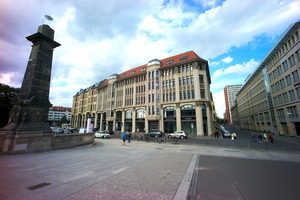 Prof Torsten Meireis, a senior colleauge in Ethics and Public Theology - who is a Professor at the Humboldt Universität zu Berlin - invited me to participate in some events here in Berlin during the summer. It has been such a wonderful and significant visit. I have had the privilege of participating in a number of academic conferences, the G20 meetings in Potsdam, visiting and doing a lecture at Bamberg University, and working on a joint research project with Prof Meireis.
Prof Torsten Meireis, a senior colleauge in Ethics and Public Theology - who is a Professor at the Humboldt Universität zu Berlin - invited me to participate in some events here in Berlin during the summer. It has been such a wonderful and significant visit. I have had the privilege of participating in a number of academic conferences, the G20 meetings in Potsdam, visiting and doing a lecture at Bamberg University, and working on a joint research project with Prof Meireis.
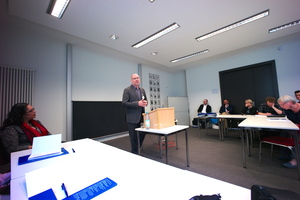 So, I arrived in Berlin on the 6th of June to participatein the first event which is a joint 'Summer School' program that is hosted by the Humboldt University, Stellenbosch University (where I teach), the University of KwaZulu Natal (UKZN), and the University of the Western Cape (UWC). Each year we meet in South Africa in February or March, and then in Berlin in June.
So, I arrived in Berlin on the 6th of June to participatein the first event which is a joint 'Summer School' program that is hosted by the Humboldt University, Stellenbosch University (where I teach), the University of KwaZulu Natal (UKZN), and the University of the Western Cape (UWC). Each year we meet in South Africa in February or March, and then in Berlin in June.
It was so wonderful to be here with South African and German colleagues - the event was arranged by Dr Clemens Wustmans from the Humboldt University and our topic was 'Religion, sustainability and politics'. The presenters included scientists, literary theorists, development specialists, religious scholars and theologians.
In this picture you will see Prof Meireis. As mentioned I was in Berlin at his invitation. In part it was also to work on a joint research grant application for a project that he and I will collaborate on. The project focuses in the ethics of 'Welfare pluralism' in South Africa and Germany - in particular how notions of welfare are conceived and who participates in the conception and expression of these concepts (the state, civil society and the religious sector, the private sector etc.) I really hope that this project will be successful! It will be a great development for my academic career, and it will also mean that I will spend a lot more time with Torsten and time in Berlin! So, I will keep you updated on how that develops!
At the summer school I presented a paper entitled 'Thinking 'olive' instead of 'red' or 'green': Seeking to bring together sustainability and development discourses in Southern African Methodist Ethics'. The paper will be finalised and prepared for publication. In the meantime, here is a short Youtube video from my series 'It's not a lecture... Just a thought!' on this topic. You will also get to see some of Berlin and my beautiful Brompton Bicycle on this trip!
Then, on the 12th of June I went to the University of Bamberg where I did a public lecture with Prof Thomas Wabel who is also an ethicist and Public Theologian. The purpose of the visit (other than the lecture) was to hand over the 'leadership' of the Global Network for Public Theology from Stellenbosch (where we hosted the last global gathering in October 2016) to Bamberg where the next gathering will take place in 2019. Thomas takes over as the hosting chair, and I will serve (at the behest of Prof Nico Koopman) as the outgoing hosting 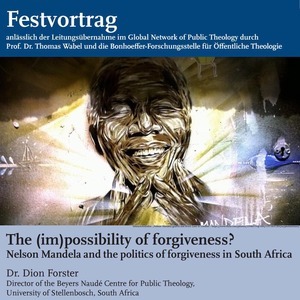 chair on the international commitee. Bamberg was amazing! It is such a beautiful city! The lecture itself went well, as did the meetings. I was so surprised to see my colleague Prof Smanga Kumalo from UKZN and Seth Mokitimi Methodist Seminary (SMMS) arrive at the lecture! He had come to the city for some meetings and heard I was doing the lecture and so attended. That was very special. Here is a poster for the lecture, and a picture of Smanga and I before the event. The title of my lecture was ‘The (im)possibility of forgiveness? Nelson Mandela and the Politics of forgiveness in South Africa’.
chair on the international commitee. Bamberg was amazing! It is such a beautiful city! The lecture itself went well, as did the meetings. I was so surprised to see my colleague Prof Smanga Kumalo from UKZN and Seth Mokitimi Methodist Seminary (SMMS) arrive at the lecture! He had come to the city for some meetings and heard I was doing the lecture and so attended. That was very special. Here is a poster for the lecture, and a picture of Smanga and I before the event. The title of my lecture was ‘The (im)possibility of forgiveness? Nelson Mandela and the Politics of forgiveness in South Africa’.
The lecture is based on two large research projects that I have just concluded (if you see my youtube channel you will find details of both). They are, the research and work that I have been doing on Nelson Mandela and political theologies in South Africa, and my 2nd PHD (which I handed in at Radboud University on 14 May 2017!) which is entitled ‘The (im)possibility of forgiveness? An empirical intercultural Bible reading of Matthew 18.15-35’. In that research project I did a 3 year qualitative empirical study on how Black and White South African Christians conceptualize, understand, and express notions and processes of forgiveness in contemporary South Africa with its significant economic, social, political and racial divides.
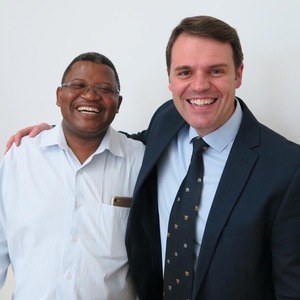
The lecture went off well and there was a lively discussion afterwards. The President of the Bamberg University, Prof Ruppert, attended the event which was a great honor. Here is a picture of myself and Prof Thomas Wabel, where the 'GNPT' Batik cloth was handed over.
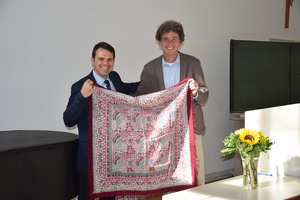
After returning from Bamberg I came back to Berlin to participate in the G20 Interfaith Meetings in Potsdam. This was a wonderful opportunity to further discuss the role of religion in the G20 nations in relation to sustainable development and migration - which are significant and important topics currently. What I found so interesting is the very important role that the G20 places upon religion and the religious across the world. The Pew Researcher (Brian Grim) spoke about their research that shows that 84% of global citizens identify that they are religious. This is significant. Of course we know that religion is often a source of conflict and social division, even abuse. Yet, at the same time it is also a great source of transformation, care, development and change. I was so grateful to be at this event thanks to my colleague and friend from Oxford University, Dr Peter Petkoff (pictured here).
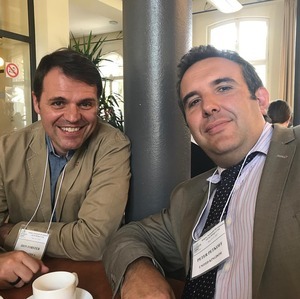
Now I am on the last stretch of my stay in Berlin. Today and tomorrow I shall participate in the opening conference of the Berlin Institute for Public theology (of which I am a member). I will be speaking on Public Theology, globalization, politics and economics tomorrow. My paper is written, but I feel that I still need to rework it a little before I present. By Friday evening I shall be home with Megie, Liam and Courtney! I cannot wait.
Trips like these are always so wonderful and significant. But, my goodness, there is nothing quite like being home with my family!



Reader Comments